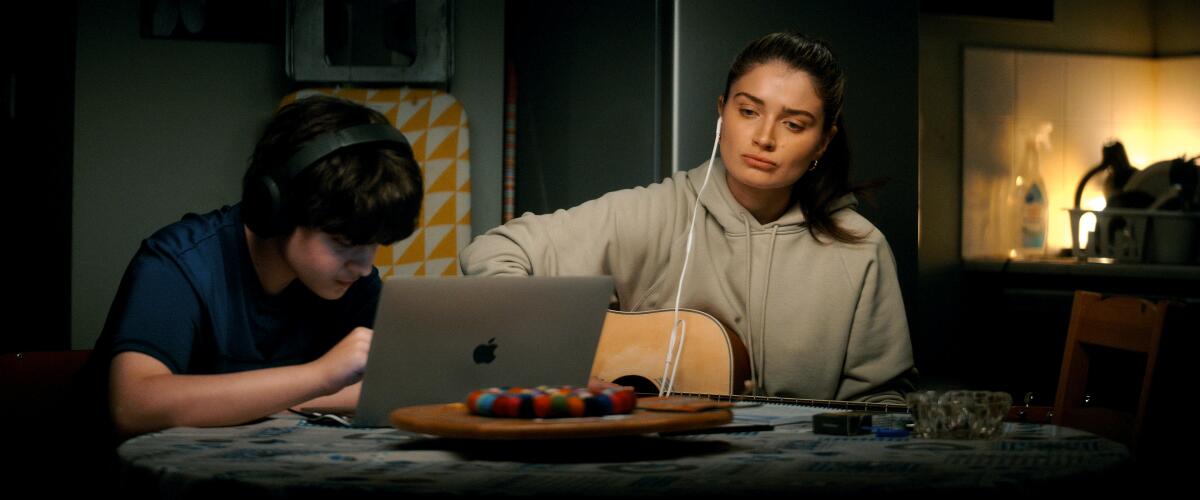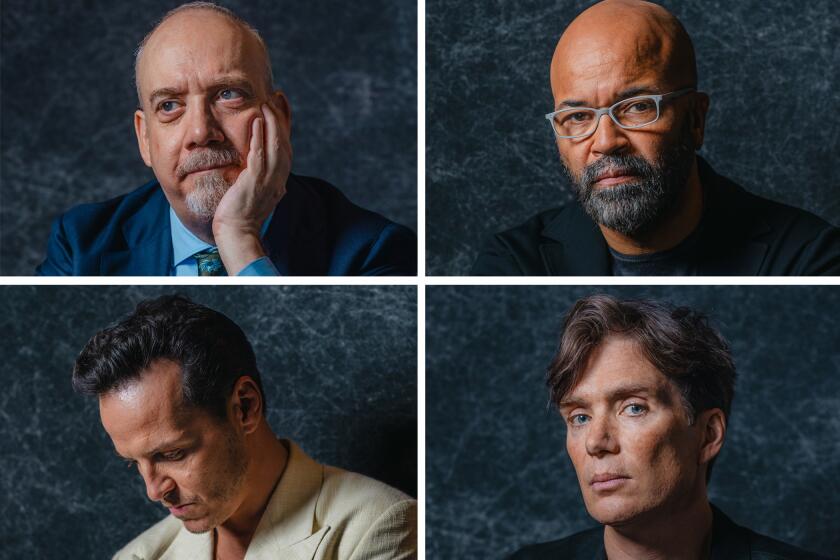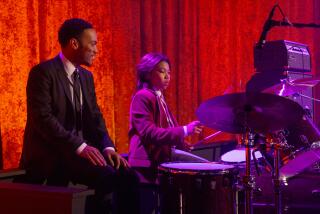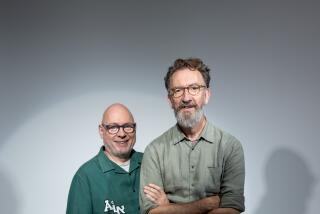John Carney’s ‘Flora and Son’ is a nontraditional musical -- just as he likes it

- Share via
John Carney doesn’t make stories with music so much as stories about music. Characters are changed by melody; relationships forged by rhyme. There’s nothing glittery about typical Carney characters. They wouldn’t belong in conventional musicals. “Flora and Son” carries on that theme with its warts-and-all depiction of a drinking-and-partying single mother (played memorably by Eve Hewson) in Dublin and clumsy-thief son Max (Orén Kinlan), who can hardly stand each other. These folks are never going to play Wembley, but their musical awakenings expand them as people and bond them as family.
“I don’t want to tell a story about Flora from the Flats who sings her heart out, gets a record deal, wins a Grammy, and that’s the only measurement of success,” says Carney. “That’s not a message I believe in.”
Flora happens across a garbage-bin guitar, rescues it, and after Max scoffs at the present, defiantly takes it up herself. Online teacher Jack (Joseph Gordon-Levitt) helps unlock her potential and the grown-ups discover incongruous harmony as aspiring rapper Max finds his own musical voice.
Flora and Max “can’t speak through language; they don’t know how to communicate. [With music], they start to find ways of communicating. It’s like learning to play a sport together; It’s a way of relating. Because you hate your family and you love them in the same weird way.”

If music is a language, then artistically speaking, it was Carney’s first language.
“I spent countless hours practicing when I should have been doing my homework, and hanging out with musicians and being in school bands. I joined a band called the Frames [led by Glen Hansard, eventual star of Carney’s breakthrough film, ‘Once’] and then I realized there was something about music that I didn’t like being my main job.
Our BuzzMeter film experts are back to predict what Oscar voters will nominate in 10 Academy Awards categories. Vote in the online polls!
“All the magical moments of my life had taken place during the listening of music. Coming home from school, sitting in my parents’ living room and watching the sun change the light on the wall, listening to ‘Stevie Wonder’s Original Musiquarium,’ or Steely Dan or Frank Sinatra, or the countless great ‘80s bands that my brother used to bring home. They were very, very pure moments. I wasn’t into having that thing turned into my job. So I slowly started getting into movies, and figured out a way of putting music into the movies and got the best of both worlds. I’m passionate about filmmaking, but my No. 1 thing will always be music.”
After working with his old bandmate Hansard (and others, including Maroon 5’s Adam Levine) on a couple of movies, Carney sought a songwriting partner for 2016’s “Sing Street” who could help him tell the story of a kid in the ‘80s taking in various musical influences (such as the Cure and Hall and Oates) and finding his own voice. He turned to Gary Clark, whose band, Danny Wilson, had a hit in 1987 with “Mary’s Prayer,” and had since been adding to his own work with writing and production for artists such as Natalie Imbruglia, Liz Phair and Demi Lovato.

“I remember distinctly relating to the Danny Wilson album when I was young,” says Carney. “When it came to make ‘Sing Street,’ I was like, ‘OK, now I’ve made a couple of films, maybe I can lift up the phone to some of my heroes.’ So I got this chap’s number. I can’t remember how I got it.”
To me, a good musical, you should be able to take all the songs out of it and it would still work.
— John Carney
“John always plays his songwriting down, but actually as a writer, he has a very clear vision of what a song should say, and very often it’s the pivotal thing,” says Clark, sitting next to Carney at Apple Studios in Culver City.
“I’d say at least 80% of the stuff on ‘Flora’ comes from an idea that John’s got, that he demos on Garage Band and sends it over to me. I usually expand on lyrics, put the thing into Pro Tools and work the track up a bit more.”
The 2024 Oscars Original Song Contenders Playlist includes Americana, Latin dance pop, acoustic guitar-driven ballads and, yes, showtunes.
It makes sense that Carney would be involved in most of the songs from inception because they are so embedded in the development of his characters and plots. But he makes nontraditional musicals; they ignore the tropes and clichés of the genre, especially in structure and stakes.
“Probably because I don’t believe in that, really,” he says. “Those structures can be picked apart by critics or analysts, but I don’t think the artists should be considering those things too much. It has to be story first because otherwise you do get into a jukebox feeling. To me, a good musical, you should be able to take all the songs out of it and it would still work. So ‘Guys and Dolls’ would still work completely and ‘Singin’ in the Rain’ would still work.”
And so would “Flora and Son.”
More to Read
From the Oscars to the Emmys.
Get the Envelope newsletter for exclusive awards season coverage, behind-the-scenes stories from the Envelope podcast and columnist Glenn Whipp’s must-read analysis.
You may occasionally receive promotional content from the Los Angeles Times.









